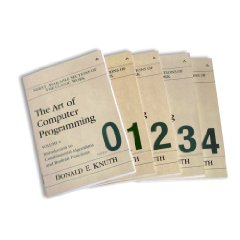
Current Edition.
Seminar Combinatorial Algorithms (Spring 2010)
Contents
|
Schedule
|
Participants
|
Deliverables
|
References

 The Seminar Combinatorial Algorithms
is intended for Master students in Computer Science.
Lectures are in English.
The seminar is organised by
dr. W.A. (Walter) Kosters;
and dr. H.J. (Hendrik Jan) Hoogeboom
is willing (and able) to also participate.
The Seminar Combinatorial Algorithms
is intended for Master students in Computer Science.
Lectures are in English.
The seminar is organised by
dr. W.A. (Walter) Kosters;
and dr. H.J. (Hendrik Jan) Hoogeboom
is willing (and able) to also participate.
In spring 2011 we will organize a similar seminar. The precise subject is not yet known at the moment,
but will be in the same vein — whatever that means.
Probably: R.A. Hearn and E.D. Demaine,
Games, Puzzles, & Computation, Peters, 2009.
(But if in the meantime P appears to be different from NP, we will examine that.)
Dates: Thursday mornings, 9.15-11.00, February 3 - April 28, 2011.
Place: Snellius, room 401
The seminar examines algorithms as they appear in the (current)
last volume of Donald Knuth's seminal work. The first lecture
will cover some background. Then,
students should study recent literature
and present their results. And perhaps even some programming?
Meetings are on a weekly basis.
Students can also suggest neighbouring subjects. For a somewhat
more detailed list, see below.
Dates: Thursday February 4 - Thursday April 29, 2010;
9.15-11.00.
Room 401 (or 412), Snellius, Niels Bohrweg 1, Leiden.
Credit points: 7 ECTS.
There is no written exam.
Prerequisites:
Algorithms, Complexity, Datastructures
(all at bachelor's level, see for
instance the Dutch course pages
Datastructures
and
Complexity).
Students should register in advance, in December 2009,
by personal visit to the organizer.
The number of participants is at most 8 (approximately :).
In this seminar we will discuss several issues dealing
with combinatorial algorithms,
as described by
Donald Knuth
in his book
The Art of Computer Programming, Volume 4, Combinatorial Algorithms.
A first version of this book is currently available in five so-called
fascicles, see below.
In the second part of the seminar we will probably discuss papers from our
n-Queens bibliography.
Students are supposed to present and discuss chapters of the book,
and papers, during class. The setup depends on the number
of participants.
Subjects are presented by the students in two one hour lectures
(i.e., twice 45 minutes); more precisely, every student student takes care of one
one hour lecture..
Note that this year's lectures are in Dutch.
Next to the oral presentations
(that perhaps make use of PowerPoint or PDF,
but the blackborad is also fine) 8
page self-contained essays on the subject must be written (in
LaTeX; in Dutch).
Deadline: one month after the presentation.
The next presenter is also asked to review the paper
by his/her predecessor.
Essays should be improved until students and organizer
agree on the contents. Students must be present
during all sessions, and are supposed to actively
take part in the presentations, e.g., ask questions.
Immediately after each lecture there is a short
discussion between students and organizer,
where the presentation is evaluated.
The first meeting is used to make a proper schedule.
Every student is supposed to choose and present at least two subjects,
one in the first half and one in the second half of the seminar.
You can use your own laptop for the presentations.
If you don't have one available, you can use ours
— let us know in advance!
In that case, please email the .ppt-
or .pdf-files a day before the presentation — at the latest.
It is wise to also put them on a memory-stick.
A beamer is always available.
| name | email |
| Giso Dal | gisodal X gmail |
| Sjoerd van Egmond | sjoerdvanegmond X gmail |
| Erik Jongsma | ejongsma X liacs |
| Tom ter Laak | ttlaak X liacs |
| Johan de Ruiter | johan.de.ruiter X gmail |
| Jonathan Vis | vysare X gmail |
| Bob Wansink | bwansink X zermelo.nl |
| Rick van der Zwet | hvdzwet X liacs |
| Wouter de Zwijger | wouterdezwijger X hotmail |
The column "version 1 BDD" deals with the first report on BDDs.
And the "2" column has the second version.
Analogous for the "n-Q" columns on N-Queens.
"OK" means that the version has been checked.
An m-dash "—" means that yours truly is still busy reading ;-).
And "nothing" means that we are still waiting ...
After the second version has been submitted, it will be made available, i.e., clickable.
A ✓ denotes that the paper is fully approved.
References are either books or papers,
see below.
Books are usually available in room 159.
Remember that most doi's can only be used from computers within the university domain.
Many other books and the internet
may be helpful.
- Donald E. Knuth, The Art of Computer Programming, Volume 4,
Combinatorial Algorithms:
- Fascicle 0: Introduction to Combinatorial Algorithms
and Boolean Functions
- Fascicle 1: Bitwise Tricks & Techniques; Binary Decision Diagrams
- Fascicle 2: Generating All Tuples and Permutations
- Fascicle 3: Generating All Combinations and Partitions
- Fascicle 4: Generating All Trees
- Computer Musings, lectures given by Donald E. Knuth.
- Papers from our n-Queens bibliography.
Questions/remarks:
kosters@liacs.nl.
September 16, 2010 — http://www.liacs.nl/home/kosters/semcom/index.html

 The Seminar Combinatorial Algorithms
is intended for Master students in Computer Science.
Lectures are in English.
The seminar is organised by
dr. W.A. (Walter) Kosters;
and dr. H.J. (Hendrik Jan) Hoogeboom
is willing (and able) to also participate.
The Seminar Combinatorial Algorithms
is intended for Master students in Computer Science.
Lectures are in English.
The seminar is organised by
dr. W.A. (Walter) Kosters;
and dr. H.J. (Hendrik Jan) Hoogeboom
is willing (and able) to also participate.
